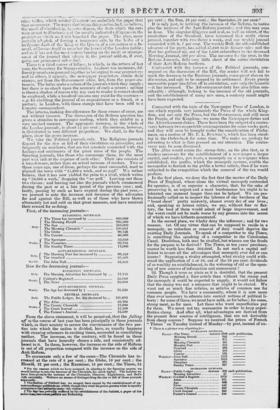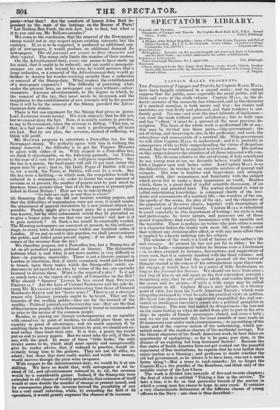Connected with the topic of the Newspaper Press of London,
is one which regards very intimately the Press of the whole King- dom, and not only the Press, but the Government, and still more the People, of the Kingdom—we mean the Newspaper-duties and. the Advertisement-duties. These have been the subject of a contro- versy between two respectable contemporaries for some weeks past; and they will soon be brought under the consideration of Parlia- ment, on a motion of Mr. E. L. BULWER'S, which has been stand- ing in the Order-book for some time. We make no apology for adverting to what is thus pressed on our attention. The contro- versy may be soon dismissed.
The Atlas would retain the stamp-duty, on the plea that, as it renders necessary for the establishment of a newspaper a larger capital, and confers, pro tanto, a monopoly on a newspaper when established, the profits, which the monopoly secures, enable the monopolist to furnish to the public a better article, than if he were subjected to the competition which the removal of the tax would produce.
In the first place, we deny the fact that the matter of the Daily Press of England, where alone the virtual monopoly contended for operates, is of so superior a character, that, for the sake of preserving it, an unjust and a most burdensome tax ought to be tolerated one moment longer than can be helped. We are pro- fessionally called on to inspect the labours of our brethren of the " broad sheet" pretty narrowly, almost every day of our lives ; and, speaking as honest critics, we say, without fear or flat- tery, the best of them would admit of large improvement, and the worst could not be made worse by any process into the secret of which we have hitherto penetrated.
In the second place, we wholly deny the inference ; and for two reasons. 1st. Of any virtue that can be supposed to reside in a monopoly, no reduction or removal of duty would deprive the existing Daily Journals. To speak of a competitor to the Times, is something like speaking of a competitor to the Caledonian Canal. Doubtless, both may be rivalled, but whence are the funds for the purpose to be derived? The Times, at ten years' purchase, cannot be worth less than 300,0001. Is not such a capital suf- ficient to insure all the advantages that monopoly ever did or can insure? Supposing a rivalry attempted, what rivalry could with- stand the application of 5 or 10, out of the 20 per cent. dividends of so wealthy an establishment, to the widening of old or the open- ing of new sources of information and amusement ? 2d. Though it were as plain as it is doubtful, that the present Daily Press supplied a finer article than without the stamp and the monopoly it could be expected to supply, it would not follow that the stamp was not a nuisance that ought to be abated. We want not so much fine articles, as articles of common use for common people. We have -a community, whom it is now more than ever necessary to educate into correct notions of political li- berty : for some of these, we must have milk, as for babes ; for some, . strong meat, as for men. Let those who want superfluities pay for them. We must not tax necessaries in order to keep super- - fluities cheap. And after all, what advantages are derived from the present dear sources of intelligence, that are not derivable from cheap sources ? Suppose we received the prices of French . " Threes " on Tuesday instead of Monday—by post, instead of ex- There is a plainer way of putting it--
INCREASING JOURNALS.
Da:iv—The Times increase 2646 each publication.
Morning Herald 942
Sun 671
Morning Chronicle 441 Morning Post 318 Standard 293 Globe 288 Courier 193 Waxittx—John Bull 1113 Spectator 1018 Examiner 592
Sunday Times 327 DECREASING JOURNALS.
Daux—Pnblic Ledger decrease 389 each publication..
Morning Advertiser Mrsisaty—Cobbette Register 1070 Atlas 821 Age 606 News 442' County Chronicle 250 Court Journal 240 Farmer's Journal 240
press—what then? Are the comforts of honest John Bull de- pendent on the. state of the bettings on the Bourse of Paris? Let Nathan Ben Funk, the rich Jew, look to that, but what is it to you and me, Mr. Bellows-mender?" ' We come to the conclusion, that the removal of the Newspaper- stamp would not in any respect injure existing interests, but the contrary. If, as is to be expected, it produced an additional sup- ply of newspapers, it would produce an additional demand for newspapers. The old journals are secure in their character and their capital. The stamp only limits the number of their readers. On the Advertisement-duty, every one seems to have made up his mind, that it ought to be reduced; and yet, could a monopoly- monger see one inch beyond his nose, he would perceive that a large reduction, or a removal of the Advertisement-duty would go -farther to destroy his wonder-working security than a reduction -or removal of the Stamp-duty. What renders the establishment Ad a newspaper expensive? The difficulty of procuring what, .under the present laws, no newspaper can exist without—adver- tisements. Increase advertisements, in the degree in which, by the removal of the tax, they must needs be increased, and the temptation to the establishment of new journals will be far greater than it will be by the removal of the Stamp provided the Adver- tisement-duty remain.
' There is but one argument for the Stamp that gives us pause. 'Lord ALTHORP wants money. We wish sincerely that he did not, but we cannot deny the fact. Now, it is nearly useless in practice, to say to-Government, when the revenue is falling, "This tax, or that, is a bad one—take it off :" in such a predicament, all taxes are bad. But by our plan, the revenue, instead of suffering, we think will profit. Mr. BVLWER proposes to substitute a Post-office tax for the Newspaper-stamp. We perfectly agree with him in wishing the stamp removed ; the difficulty is to get the Finance Minister to agree with either of us. With respect to a Post-office tax, we think it objectionable, on the following grounds. 1st. Unless in the case of a very few journals, it will prove unproductive. Say the tax is a penny, the local paper will sell 33 per cent. below the paper sent by post ; that is, the Daily Paper of Dublin will cost 6d. a week, the Times, at Dublin, will cost 2s. a week. Say the tax were a farthing,—in which case, the competition would be reduced to a minimum,—in order to insure the same amount of revenue as at present, the number of papers sent by post must be fourteen times greater than that of all the papers at present pub- lished in Great Britain ! How are we to convey them ?
" Go build new mails, or send them in a wain !"
2d. Granting that the tax did not localize existing papers, and that the difficulties of transmission were got over, it would render the attainment of general circulation by a new journal almost im- possible. People Might give a larger price for a journal which was known, but by what inducement would they be prevailed on to. give a larger price for one that was not known ? and how is it to gain notoriety ? 3d. Such a tax would be constantly evaded. The Morning newspapers are conveyed at present, by the ordinary stage, to every town of consequence within one hundred miles of London. If we put an end to this practice, we shall inconvenience the public, and inflict great private injury : if we allow it, what comes of the revenue from the tax?
We therefore propose, not a Post-office tax, but a Stamp-tax of ld. on all periodical papers, political or literary. The distinction between what is and what is not news matter, is very difficult to draw—in practice, impossible. There is not a literary journal in London or elsewhere, that, if nicely examined, would not be found to trench upon those topics which the Stamp-office vainly en- deavours to set apart for us who, by virtue of the tax, are specially licensed to discuss them. What is the report of a play? Is it not as much news as the report of a night of COmmittee on the Bill ? Why should " Spencer" LISTON be less sacred than SPENCER PERCEVAL ? Are the feats of' Colonel SIBTHORP and his aide-de- camp Mr. KEARSLEY a whit more interesting than those of General Bombastcs REEVE and his "brave army ?" -There is yet a stronger reason why Literary journals ought to be taxed. They are the luxuries of the reading public—they are for the learned of the wealthy: Political journals are for everyday use—they are the food of the common people, which Government is bound to accommodate in-price to the means of the common people. Besides, in placing our literary contemporaries on an equality with ourselves in point of burdens, we should place them on an equality in point of advantages; and we much question if, by enabling them to transmit their labours by post, we should not ex- tend rather than limit their sale. It is true, a penny tax would put an end to penny papers. But we must take the evil, if this be one, with the good. In many of these "little books," the only rivalry seems to be, which shall most openly and unequivocally give its reader advice, that, if reduced to practice, -would in- evitably bring him to the gallows. They are not all alike, we admit ; but those that were really useful, and worth the money, would survive though the price were twopence. With respect to the Advertisement-duty, we would fix it at one shilling. We have no doubt' that, with newspapers at 4d. in- stead of 7d., and advertisements reduced by 2s. 6d., the revenue would be 'a considerable gainer. Indeed, if the Stamp-tax were extended to all classes of weekly periodicals, that extension of-itself would at once double the number of stamps at present issued, and by consequence plate the revenue beyond the possibility of any but a very small reduction, while, by extending the field of its operations, it would greatly augment-the chances of its increase.




























 Previous page
Previous page